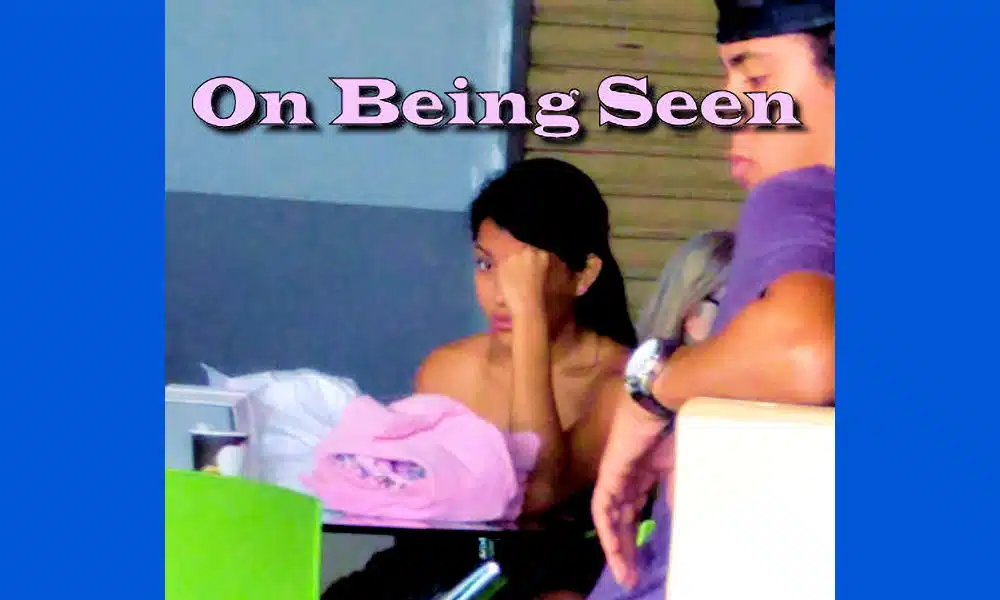On Being Seen — it takes a bit of effort to watch ourselves story-making, and to let that go long enough to see and be seen

My first and most popular book,
This Endless Moment.
Learn to live a full and satisfying life.
Being seen is alternately scary and desired above all. And our conditioning tends to get in the way.
I remember being in some workshop somewhere and spotting a friend across the room. We met up after the gig was over, and she said to me something to the effect of, “Isn’t it nice to meet up with a member of your real family?”
Later, that got unpacked as an expression of how good it feels to look over the heads in a crowd and “recognize” someone that you are simpatico with.
All of which has to do with being seen
The photo at top was taken in the bus station in Liberia, Costa Rica. The young woman was staring off into space; then she’d focus in on the guy in front of her, then she’d sigh, and look sad.
I watched this for a bit, then ended up taking a picture, and when I blew it up, she seemed to be looking right at me.
I take a lot of photos of people, as this blog is relentlessly in need of them. Lately, I’ve been using my quite good cell phone camera, and the downside is that I can’t really tell what I’ve got until later. Plus, it has the disconcerting habit of shooting the photo several seconds after I hit the button, so images are often a surprise.
Anyway, I was amazed that she seemed to be looking right at me, and in a sense seeing to and through me. I saved the shot, and it occurred to me that it ws perfect for this article.
I have a sense that the feeling we get when we think that we “click” with someone is likely hard-wired into our genes, and also, it’s not very reliable.
In Zen, we talk about form and emptiness, and also about how we “identify” with stereotypes. By identify I mean that we make determinations about the character of others based upon smoke and mirrors.
For example, I notice a predilection in myself to “like” Canadians, and to have all kinds of judgements about people from the US of A, despite being from there myself. I left decades ago, and like to forget that my formative years in the States ever happened. One of our weirder friends knows this, so he continually apologizes in my presence for making disparaging remarks about the US, despite the fact that I self-identify as a Canadian, and have lived in Canada since 1975.
And up goes my back.
All of this has nothing to do with anything other than the stories I tell myself, and the fact that my “quasi-friend” likes to poke at people to see if he can get a rise out of them. This doesn’t work without the cooperation of the “pok-ee.”

Our inner reactions to things we provoke ourselves over can’t be helped.
It’s what the Buddha called monkey mind. Our minds can barely stand not chattering–leaping from branch to branch–going after the “better” fruit. We all do it; we just need to notice.
So, have another look at the lead photo. See if you can tell yourself a story about the guy, the girl, the situation. Let your imagination run a bit.
See? Monkey mind.
Where it goes all topsy-turvy is when we give validity to the stories we create.
And even if we could walk into the photo and ask the young woman what’s on her mind, we’d only get the part of the story she decides to share.
Same thing with the initial illustration–the one about “meeting our tribe.” That kind of “soul-mate” stuff often gets shoveled in group meetings, especially if the group can be in any way construed as being a collection of “aren’t we special” folk. We create a story about our specialness, flesh it out, and then desperately want to add others to the mix.
It’s the same process that causes us to think we are in love.
Hormones signal attraction, and rather than going “Wow! I’m turned on!” we go, “This is true love!” And once that bridge is crossed, for many couples the rest of their time together is an often futile attempt to turn the partner from who they really are into who we think they ought to be.
- Being seen, on the other hand, has very little to do with either trying to fit yourself in somewhere, or trying to make others fit into some dopey story.
- Being seen is dropping the games and the stories, and simply being honest–both with yourself and with others.
- Being seen makes little of the games our heads are playing, and a lot of simply opening the doors to being honest.
It’s treating fellow humans as the unique beings they are, while ruefully watching our little heads try to mash them up and fit them in a box.
Clearly, true intimacy is about this kind of dialogue: here is who I am right now, here is the story I am telling myself, and now that that’s out of the way, what’s up for you?
Less certainty, more curiosity.
Not easy, not fun; it’s hard work to keep the monkey mind in the background while opening yourself to self and other scrutiny.
But hey, most people feel lost and alone and misunderstood, right?
So, maybe another way of interacting is necessary.
